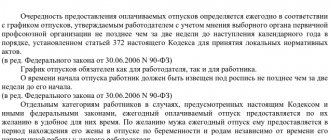Long-term leave for teaching staff up to 1 year and the procedure for its provision in practice.
Long-term leave of absence for teaching staff for a period of up to one year is provided for by the federal law “On Education in the Russian Federation”. What is the procedure for granting long-term leave to teaching staff?
Teaching staff have the right not only to extended annual paid leave. Once every ten years of continuous work, teaching staff have the right to a long vacation, lasting up to one year.
Will a long vacation be included in teaching experience?
Teachers who have dedicated more than ten years of their lives to the profession and have accumulated relevant experience have the right to go on a fairly long vacation.
However, few of them know about this possibility. Next, we consider how long such leave lasts for teaching staff, what are the criteria and algorithm for obtaining it, and also whether management has the right to recall a staff member from it. The issue of teaching staff going on long leave is regulated by several legislative acts:
- Federal Law No. 273 (clause 4, part 5, article 47);
- Labor Code of the Russian Federation (Article 335);
- The procedure approved by Order of the Ministry of Education and Science of Russia No. 644.
The latter document replaced the expired Regulations approved by order of the Ministry of Education of the Russian Federation No. 3570.
According to the latest document, employees can go on such a long vacation:
- having at least 10 years of continuous professional experience;
There is a kind of conflict with this requirement. So, based on Art. 335 of the Labor Code, the right to take a year-long vacation does not correlate with the mandatory 10 years. It only talks about the frequency of its provision (no more than once per decade).
Practice also shows that the presence or absence of these years has little effect on the satisfaction of a request for retirement.
However, the Regulations approved by Order No. 644 place emphasis on ten years of experience as an indispensable condition for satisfying the request of a staff unit.
- holding positions listed in section. 1 of the relevant Nomenclature, approved by government decree No. 678 of 08.08. 2013
As for the first point, the duration of work is determined based on:
- notes made in the work book;
- other documents proving the fact of official employment.
Experience for applying for leave, in accordance with clause 4 of the Procedure, approved. by order No. 644, includes:
- duration of actual work under an employment contract, interrupted by more than a quarter;
A break in length of service will not be counted if the person changed jobs or was in unemployed status for less than 1 month while looking for a new job.
- the time the employee is absent from the workplace, provided that it, as well as the position, was retained by him (absenteeism due to illegal removal or severance of employment relations is also taken into account here);
- the period of paid practical training during training in educational institutions at various levels, as well as postgraduate and doctoral studies;
- leave to care for a child under three years of age (previously the limit was 1.5 years).
Experience can be gained in various educational institutions, including private ones, but subject to them passing state accreditation.
Based on the second point, the following teaching staff can go on long leave of up to 1 year:
- educators, counselors, trainers, tutors;
- music directors;
- production masters;
- methodologists and assistants;
- teachers;
- department staff;
- managers of departments, faculties, institutes.
This year, as before, the right to such leave is approved by domestic legislation, but the prerequisites for its provision are fixed in such a LNA as a collective agreement (clause 5 of the Procedure, approved by Order No. 644). It spells out the following details:
- duration limit;
- order of receipt;
- prerequisites and algorithm for breaking into parts, as well as joining the main vacation period;
- grounds for extension (for example, taking sick leave during vacation);
Caring for a sick household member is not a basis for extending a year's leave.
- provision to part-time workers;
- how long-term vacations of teaching staff up to 1 year are paid;
- other conditions.
In addition, guarantees for employees who took long leave were not subject to any adjustments. They, as before, retain their place of work (position) and academic load (provided that it has not decreased under the influence of objective factors). Also, they cannot be transferred to another position or the contract with them can be terminated (except for the situation when the entity is liquidated).
A subordinate who wishes to take a year off must do the following:
- draw up an application in free form, which is subsequently submitted for consideration to the manager;
It is necessary to indicate his personal data and the full name of the headed institution, as well as his data and position, after which he must state a request for additional leave of a certain duration and provide evidence of work experience (refer to employment or other documents). The application is dated at the end and the applicant signs it.
- wait until the boss checks whether there are prerequisites for making a positive decision on sending the employee on such leave;
- wait for the manager to issue a vacation order (in practice, in form No. T-6, but using a self-developed form is allowed);
Leave for heads of institutions is issued by order of the Ministry of Education of Russia.
- make sure that the responsible person has entered information about him in his personal card.
If a vacation period is provided according to the schedule, its transfer is possible only if both parties agree to this. In this case, an additional application is written with a request to cancel the set deadlines and reschedule it. The manager may refuse to satisfy it.
In practice, an employee’s departure on a year’s leave is preceded by:
- fulfillment of the educational load provided for by the work plan drawn up at the beginning of the school year;
- timely notification of management of such intentions. This is done so that it quickly delegates the workload to other staff units.
However, this is not necessary and leaving can take place at any time.
If necessity obliges, the employee can be called by his superiors to the workplace from a year’s leave, but only with his consent to this (Article 125 of the Labor Code of the Russian Federation). This means a statement written by him stating that he has no objections regarding the early fulfillment of his functionality.
At the same time, the manager is obliged to agree with the subordinate on the option of using the remaining vacation days and record the decisions made in the recall order.
As confirmation of familiarization with this document, the employee puts his signature on it.
The employer is not expected to compensate a subordinate for a year's leave taken at the federal level. However, it can be prescribed in the collective agreement. In this case, the sources of payment will be the funds received by the institution from profitable activities, in the manner specified by this document (payment for educational or educational services provided).
Summarizing the above, it should be noted that the issue of granting an education worker a leave of 12 months is regulated by several legal acts.
Despite this, many issues remain unresolved at the federal level.
Moreover, educational organizations have been delegated the authority to independently determine a number of important issues, such as the vacation limit, which is fraught with the emergence of controversial situations that require resolution.
voice.,
out of 5)
How can an educational worker go on a long-term vacation? Is it possible to go on vacation if the school year has not yet completed? How to draw up and submit an application? All the details are in the material below.
According to the Labor Code, employees of the educational sector have by default the right to extended rest. All the nuances of teaching work are highlighted in the law in Article No. 335. Various nuances of the work are taken into account, including the period worked, the period of practice and the replacement of other employees.
Employees of preschool and school institutions, as well as other educational institutions, have the right to paid extended rest for a period of forty-two calendar days. Employees of primary, secondary and higher educational classes who teach students in workshops and other courses to improve professional skills have the right to 56 days of rest. through training.
We invite you to familiarize yourself with: Regulations on granting leaves to teaching staff
As well as employees of support and psychological assistance services at a school or other educational institution, and employees in a medical institution where she is trained. According to the law, taking into account certain criteria, employees have the right to receive leave for up to 365 days, after each ten-year period of work.
By definition, employees working in the educational sector have an advantage over other categories of workers. Their basic rest has been increased by 42 to 56 days during the calendar year. The duration is determined by the type of organization and the position held by the employee. This right is given due to the increased psycho-emotional stress that teachers experience during work.
Duration
Teachers are a separate category of employees whose vacations are extended by default, that is, they are longer than 28 calendar days initially. Pedagogical leave has a minimum and maximum duration, determined by Article 335 of the Labor Code of the Russian Federation.
The minimum length of additional leave for a teacher is forty-two calendar days. Maximum – fifty-six calendar days. Once every ten years, an employee of the educational sector has the right to paid rest for up to one calendar year.
The teacher has the right to take a long leave of absence during the school year, while this factor of damage does not cause damage to the organization, and the teacher’s workplace and number of hours are retained. At the same time, referral to another place of work, position or layoff at the request of management is unacceptable.
To extend the basic vacation by adding an additional day to it, you need to send a request to the head of the institution. Work experience, periods of downtime and work practice are taken into account. After this, the manager issues an order to assign the employee time off for a period of up to one year. Factors such as payment for rest, period, queue, etc. are determined in the organization’s labor charter or local regulations.
The application for long-term leave has the sample established by GOST. The act indicates the full name. head or substitute and full name of the institution. Personal data and position of the employee, based on the request for additional time off, the period, and the right to satisfy the application is ten years of work experience. Below is your full name. and the signature of the originator.
- Extended paid leave every year.
Article 334 of the Labor Code of the Russian Federation determines that teachers have the right to extended annual leave. Leave is subject to the same provisions and is governed by the same principles as employees in other sectors. The only difference is that its duration on average exceeds regular vacations by 10 days. There is no exact figure for the duration of annual teacher leave. Its length is set by the Government of the Russian Federation. - Annual leave for teaching staff. This type of leave is regulated by Article 335 of the Labor Code of the Russian Federation and is suitable for employees who have 10 years of continuous experience in a teaching environment.
Continuous teaching experience includes (clause 4 of the Procedure)
- the time of actual work in positions of teaching staff under an employment contract, while the permissible break in the length of service cannot exceed three months;
- the time when the teaching staff retained their place of work (parental leave, temporary disability, and so on);
- time of forced absence (illegal dismissal, illegal transfer to another job);
- time for filling positions of teaching staff under an employment contract during the period of practical training, provided that the period between graduation from the educational organization and employment did not exceed one month.
Long vacation pay
Types of teachers' leavesHow the teacher's annual leave is regulatedPossible violations of the provision of annual leave and ways to solve themHow to find out which professions can receive paid leave
According to the law, the function of vacations is to create conditions under which the employee can restore efficiency and strength. To achieve this, labor legislation gives every employee the right to receive annual leave with pay of 28 days.
However, a number of professions require extended vacation time. Teachers fall into this category. But, in addition to the fact that teachers rest on average 10 days more every year, they are entitled to an additional annual teacher leave.
Under what conditions it can be obtained, and what situations can lead to cancellation of vacation - we will discuss below.
Register now and get a free consultation from Specialists
If the first type of vacation does not raise questions, then the second case requires a separate explanation.
For the first time, annual leave for teachers was introduced in 1992, when the Law “On Education” was adopted in the Russian Federation. Since then, teachers whose continuous teaching experience has amounted to 10 years have the right to a long leave of 1 year with retention of their place.
This norm was transferred to the Labor Code, formulated in Article 335 of the Labor Code of the Russian Federation. At the same time, since the state does not interfere with the procedure for granting leave, the management of educational institutions often abused interpretations, denying leave either due to the lack of continuous ten years of experience in one particular institution, or granting leave for the writing of scientific papers and monographs.
Thus, when receiving annual leave, how many days to use from it is up to you to decide at your own discretion. However, if you plan to return early from vacation, you should notify management several weeks before you plan to return to work.
The following common violations by management in the procedure for granting vacations should be highlighted:
- Denial of leave due to the fact that the teacher has worked for the last 10 years in different schools
- Denial of leave due to the fact that the educational institution is private
- Providing leave for writing monographs, scientific papers, etc.
- Sent on a year's leave with a subsequent reduction in pay/hours.
- Denial of leave due to the fact that 10 years of work experience was interrupted by maternity leave.
However, Ministry of Education Order No. 3570, issued in 2000, makes it clear what the requirements are for a candidate to take a year's leave.
According to the law, the work time must be continuous, but according to clause 4 of the order, the conclusion about the “continuity” of the length of service is made on the basis of the labor record. Those. places of work and their number are not important if the employee changed jobs without breaking his work experience.
Important: “uninterrupted” is a change from one job to another, provided that the time the person was without work did not exceed 1 month.
The status of the educational institution does not matter. Employees of educational institutions of any status can apply for leave. Those. according to paragraph 3 of the Order, non-state educational institutions fall under this category if they have official accreditation from the state as educational institutions.
The length of service includes the entire time the employee retained his job, even if he did not work. An exception is paid parental leave for up to 1.5 years.
Long rest for teachers, summer and winter holidays are one of the advantages of the teaching field.
Employees of schools and other educational institutions have the right to issue it during other periods, but so that the absence of a teacher does not affect the educational process, most employees choose vacation time for this purpose.
A less intense summer schedule (and a different vacation period) allows teachers to go on an annual paid vacation without entrusting students to other specialists.
Art. 335 regulates a year's rest for teachers in each 10-year period of continuous work. The registration procedure is determined by the local executive authority (Ministry of Education), while guaranteeing the employee:
- safety of the teacher’s workplace after the expiration of the rest period;
- the presence of the same hourly workload for the teacher (in the absence of innovations at the legislative level);
- fulfillment of labor obligations in the same territory and in the same institution (transfer of an employee is possible only with his consent or upon liquidation of the company);
- adding to the annual period the number of days in the presence of sick leave (for being on sick leave), or days of rest are transferred to the nearest future;
- provision of a year's vacation when caring for a sick family member by an employee (the rest period does not increase or decrease).
We invite you to read: What payments are due to an employee upon layoff?
Even the personal circumstances of teaching staff (subject to all conditions prescribed by law) will be the basis for granting long leave. The first section of the new nomenclature of positions, approved by the Decree of the Government of the Russian Federation, names all teaching staff who can ask employers to provide such leave once every 10 years.
If a teaching worker’s work experience is, for example, 30 years, and he has never taken a long vacation, he still may not receive it. Before writing an application for leave for a year, teaching staff need to open their work book and count how many consecutive years they have been engaged in teaching activities. If your continuous teaching experience is less than ten years, it is premature to apply for this type of leave.
New rules for measuring teaching experience allow an employee to form it from the time actually worked under a contract in different educational institutions. It is even possible to work in private educational organizations if they have passed state accreditation. Here it is important to understand that periods of work in different educational institutions are summed up to provide long leave of up to a year to teaching staff only if the break in work when moving from one institution to another did not exceed three months.
You can apply for a long leave of up to a year for teaching staff only if their individual hourly workload, established by a local act for a certain period, is completed, as a rule, for an academic half-year or an academic year. When a teaching worker is convinced that he has the right, the grounds, and the desire to go on sabbatical leave, when completing all the necessary documents, he may encounter a number of unexpected obstacles.
Firstly, the employer may be against such leave during the period for which the teacher has scheduled it. There can be many reasons: problems with personnel - there is no one to carry out the teaching load, other employees being on long-term leave, underfulfilled workload for the previous period.
To avoid such obstacles, you should plan any type of vacation in advance and inform management about your plans.
If previously the issues of granting long leave to teaching staff were determined by the Charter of the educational institution and local acts, which stipulated whether it could be taken in parts or only in its entirety, what was the priority and procedure for its provision, what was the procedure for combining it with other types of leave, how to extend it in the event of illness, now all these issues are spelled out in the collective agreement.
The employer’s obligation to pay a teaching employee for the period when he is on long-term leave is not legally established. If the collective agreement provides for the possibility of such payment, then the source of funding for vacation pay will not be budgetary funds.
If an educational organization provides additional educational services on the basis of full reimbursement of funds by students, then this extra-budgetary fund can be used to pay for additional vacations for teaching staff. As a rule, this applies to employees for whom the educational organization is the main place of work. The provision of such leave to part-time workers is also carried out on the basis of the provisions of documents that are approved by the educational institution.
Types of vacations
The Labor Code of the Russian Federation has a special article 114, which prescribes a type of recreation such as vacation. Everyone who works under a contract is given the opportunity to spend 2 weeks at their own discretion without attending work. At the same time, the person receives money and a guarantee that no one will take his place during this time.
For teaching staff, annual paid leave has its own specifics related to the time of its provision and duration. Labor activity in educational organizations is associated with interaction with children and adolescents, who not only need to be taught, but also released on vacation, as well as with the implementation of educational, methodological and scientific functions. The possibility of receiving extended annual paid leave for teaching staff and sabbatical leave is approved by law.
The emergence of types of vacations different from those enjoyed by other categories of workers is associated with the characteristics of their professional activities. Thus, sabbatical leave is a type of extended paid leave for teaching staff, the right to which is available to employees noted in the resolution.
Teacher's maternity leave
In fact, the concept of “maternity leave” does not exist. The law provides for two types of leave related to pregnancy and children. This includes maternity leave and parental leave.
There are no special rules for teaching staff – everything will be the same as everyone else’s. Maternity leave is granted when, in the opinion of the doctor observing the pregnancy, there are 70 days left before the birth. In this case, a certificate of incapacity for work is issued for 140 days immediately - 70 days before childbirth and 70 after (Article 255 of the Labor Code of the Russian Federation). If the ultrasound shows that there will be more than one baby, 84 days will be counted until birth. If the birth is complicated (for example, cesarean section) or more than one child is born, the period after birth will be increased to 86 and 110 days, respectively.
At the same time, the teacher, like any other employee, may not go on maternity leave right away - here the woman herself decides when to take advantage of this benefit. This is her right, not her responsibility. If the work is not difficult, you can do it even until the birth.
Parental leave (Article 256 of the Labor Code of the Russian Federation) can be used not only by mom or dad, but also by any relative. This leave is granted on the basis of the child’s birth certificate. That is, if, for example, twins were born, then the right to two parental leaves arises. One can be used by the mother, the other by another relative.
Leave is granted until the child reaches three years of age - there is no leave until one and a half years. This benefit is paid for up to one and a half years. And vacation is until three. While there, you can work remotely – if your job allows it – or work part-time while maintaining benefits.
Will a long vacation be included in teaching experience?
When going on vacation, teaching staff receive vacation pay. The amount of payment is determined by the accounting department. To calculate the amount due to an employee, you need to know how much he received over the last three months and how many days he worked during this period. When determining average daily earnings, all additional payments are taken into account.
For teaching staff, this may be an additional payment for leading a subject-cycle commission or conducting a state final certification. If during the specified period payments were made at the birth of a child, in connection with marriage, or other financial assistance was provided to the employee, this will not be taken into account when calculating vacation pay.
Since vacation is counted in calendar days, weekends falling within this period are also paid. Payment for non-working holidays that coincide with vacation is not made. The amount of vacation pay will be equal to the average daily earnings of a teaching employee multiplied by the number of vacation days.
The procedure for granting teaching staff long leave
- Teachers for whom the amount of teaching work is not important
- Education workers who need to meet certain conditions in order to receive leave.
The first category includes teachers, lecturers, professors, assistants, associate professors, etc. Those. This is a category of people for whom teaching is their main occupation.
The second category is employees of the educational sector of the administrative sector. These are managers, deans, directors, etc. To receive annual leave, such teaching staff need to prove their teaching experience. The volumes are as follows:
- 150 hours of teaching per year or more - for universities and other educational institutions where they receive higher professional education or improve their qualifications.
- 240 hours or more - for institutions of additional, primary or secondary vocational education. 6 hours every week – for other educational institutions.
If you have any questions, ask our lawyers on the Legal Services Exchange!
Long-term leave for the rector, director, head of an educational institution, head of an educational institution is formalized by order of the Ministry of Education of Russia. 3. Long leave may be granted to a teaching staff at any time, provided that this does not adversely affect the activities of the educational institution. 4.
The order and timing of long-term leave, its duration, addition to annual paid leave, the possibility of payment from extra-budgetary funds and other issues not provided for by the said Regulations are determined by the charter of the educational institution. 5.
Long-term leave for up to 1 year is provided subject to holding a teaching position in the relevant educational institution and having continuous teaching experience. Within the meaning of Art.
2018 N 644 “On approval of the Procedure for granting teaching staff of organizations engaged in educational activities long-term leave for a period of up to one year” 2.
Teaching staff holding positions named in section I of the nomenclature of positions of teaching staff of organizations engaged in educational activities, positions of heads of educational organizations, approved by the Decree of the Government of the Russian Federation of August 8, 2013.
Article TCRF 335
We recommend reading: Where to find out your taxes
A teacher is not a profession, but a calling. How often we hear these words, but none of us think about how difficult it is to work as a teacher. After a while, you really want to go on a long vacation to take a break from schoolchildren or students. You don’t want to quit, because searching for a job can take a long time, so a 1-year vacation comes to the rescue.
Long-term leave is granted on the basis of a corresponding application from the employee. It must be submitted in advance so that the management of the educational institution has time to restructure the workload. Previously, breaks between jobs were not taken into account in the length of service required for this.
In addition, the procedure for calculating length of continuous teaching work when receiving such leave has been clarified. In accordance with the new regulations, the duration of continuous teaching work is established by the organization in accordance with entries in the work book or on the basis of other properly executed documents confirming the fact of continuous teaching work.
We suggest you read: Is sick leave before a vacation beneficial and what is the best way?
According to federal regulations, they can refuse for each specific period, and not refuse at all, which cannot be done (the right to do so is guaranteed by law) - see paragraph.
Establish extended annual paid leaves for employees of educational institutions and teaching staff of other institutions, enterprises and organizations in accordance with the attached List.
Resolution of the All-Russian Central Executive Committee and the Council of People's Commissars of the RSFSR of July 1, 1933.
The director of a school or the rector of a university cannot independently determine the duration of leave for teaching staff: in Decree No. 466 of the Government of the Russian Federation dated May 14, 2015, it is legalized for all positions. In this document, when clarifying who can rest and for how long, the type of educational institution is also indicated. The administration and all personnel of schools and universities receive a maximum extended paid leave of 56 days.
The duration of vacation for teaching staff and managers in the additional education system, as well as for everyone who works with preschoolers, is 42 days. For this category, vacation can be extended by another two weeks if the functionality is related to the study and upbringing of children with disabilities or the implementation of general developmental and pre-professional programs in the field of art.
The difference in extended paid leave of up to 42 days is secured by law and for teaching staff of institutions involved in projects to identify children with outstanding abilities.
There are a number of restrictions that apply in this situation and do not allow an employee to be recalled from vacation, even if the employer is experiencing a serious staffing shortage. We are talking about teaching staff whose additional leave is related to their studies. It is also impossible to recall from vacation those who are under 18 years of age (such teaching staff are rarely found in educational institutions) and pregnant women.
A teacher can begin work only if he has written a corresponding application, and the manager has issued an order indicating for what reasons and from what time his vacation is interrupted. The employer is obliged to provide the unused part of the vacation, having agreed on the terms with the employee.
The deadlines for granting the rest of the leave to teaching staff are prescribed in the same order, which the employee must be familiar with upon signature. While the employer has the right to take the initiative to terminate vacation if there are compelling reasons, the employer cannot dismiss an employee during vacation and transfer him to another position under any circumstances.
Even in the case of a year-long leave, the employer is obliged to retain the teaching load and position of the teaching staff. When returning from leave, a teacher cannot receive fewer teaching hours if the curriculum remains unchanged and the number of students remains the same.
There are quite a lot of organizations operating on the territory of the Russian Federation, whose employees, by the nature of their work, are also associated with children - with their treatment, organization of recreation, activities with orphans and those children who are left without parental care. There is also a related area with education - the scientific field, in which the nature of the work is in many ways similar to activities in universities.
Before the entry into force of Resolution No. 466, employees of these organizations had the right to extended leave. Currently, this right is reserved only for employees of organizations that have licenses and implement any educational programs. Those engaged in social or scientific work are not entitled to extended leave for teaching staff, since these employees are not included in the list approved by Government Decree.
Procedure and terms of provision
As a rule, the employee submits a written application to the manager with a request for long leave.
The manager checks whether the employee has the length of service required to exercise this right and evaluates the possibility of granting leave within the period specified by the employee. If the required length of service is available and there are no obstacles to applying for leave, the manager issues an order to grant leave and enters information about it into the employee’s personal card in the general manner.
Many educational organizations do not allow long-term leave to be granted to two or more employees at the same time.
Attention! The experience required for leave can be gained in various educational organizations, including private ones, but only if the latter have state accreditation.
Since 2020, new rules for calculating length of continuous teaching work for such leave have been clarified:
- actual time worked for filling positions of teaching staff under an employment contract;
Attention! Such periods of actually worked time are summed up only if the duration of the break between dismissal and entry into work is no more than 3 months.
- the time when the teacher was not actually working, but he retained his place of work (position) (forced absenteeism, transfer to another job and subsequent reinstatement to his previous job);
- time for filling positions of teaching staff under an employment contract during the period of practical training, if the break between graduation from an educational institution and entry into teaching work did not exceed 1 month.
Attention! The length of service required for a teacher’s long leave is not considered interrupted if the employee moved from one organization to another and did not work for less than 1 month.
Thus, if previously the length of service required for a long vacation did not take into account breaks between jobs, now the situation has changed.
This is important to know: Application for part-time leave: sample 2020
As a rule, in order to retire, a teacher must fulfill a number of requirements:
- complete the teaching load provided for in the work plan at the beginning of the year (teacher - 36 hours per week, speech therapist - 20 hours per week);
- the teacher must primarily be registered as the main employee in this organization;
- notify the manager in advance so that he can adjust the curriculum and distribute the workload among teaching staff.
It is legally determined that the duration of long-term leave, the order in which it is granted, its division into parts, extension on the basis of a certificate of incapacity for work, the addition of long-term leave to the annual main paid leave and other issues are determined by the collective agreement, and not by the charter of the educational institution, as was the case previously.
The collective agreement of an educational organization should consider the following provisions:
- duration of vacation (no more than a year), frequency of vacation is displayed in the schedule;
- the priority of its provision (but not less than once every 10 years);
- possibility of extension in case of illness;
- adding vacation to the annual basic leave;
- the possibility of obtaining such leave for a part-time worker;
- payment, in cases where it is not required by law.
Attention! If vacation is provided in accordance with a certain schedule, then such vacation can be postponed only with the consent of both parties. To do this, you need to write another application with a request to cancel the already assigned vacation and reschedule it for another date. However, the manager has the right to disagree.
The right to vacation once every 10 years
If, for example, a teacher decides to write a dissertation, he can apply to his employer for a year of leave, to which all teaching staff are entitled. Writing a dissertation is a good reason that gives you the right to stay away from work for 365 days. If necessary, other teaching staff will also be granted long leave, in accordance with the conditions specified in Art. 335 Labor Code of the Russian Federation, clause 4, part 5, art. 47 Federal Law “On Education in the Russian Federation”.
Good cause is not the only condition that must be met. There must also be one year of unused leave for the last ten years.
The legislative framework
Labor Code, in particular Art. 335, establishes the right of workers who are employed in organizations conducting educational activities to a long vacation, subject to continuous work as a teacher for 10 years.
The nomenclature of positions for teaching staff, approved by Decree of the Government of Russia dated August 8, 2013 No. 678, determines specific positions eligible for long leave.
Order of the Ministry of Education and Science of the Russian Federation dated May 31, 2020 No. 644 approved the “Procedure for granting long leave to teaching staff.”
Scheduled vacation: possibility of transfer
Despite the fact that there is an unspoken agreement to provide vacation to teaching staff in the summer, it can also be granted at other times of the year. At the same time, you need to know what pitfalls there may be in order to avoid doing what is prohibited by law.
For all vacation calculations, the employer will be based on the employee’s time working in the institution. If 6 months have already been worked, the right to annual leave has appeared. Now you can decide how to use it, completely or in parts. In the latter case, it is important that one of the parts is at least 14 calendar days. To receive the required 56 days, from the date of employment the employee must work not 6 months, but 12.
When the pedagogical process is underway, granting vacations to teaching staff even for 28 days is undesirable. Therefore, it is common practice to provide vacation in advance. This is understandable, since during the educational process it is sometimes impossible to find a replacement, and children must receive knowledge in full
Vacation schedule
In all organizations, the provision of extended annual leave to teaching staff is regulated by a schedule approved before the start of the calendar year. The schedule is drawn up in a unified form and approved by the head of the organization. The vacation dates of teaching staff, fixed in the schedule, are agreed upon and brought to the attention of all employees against signature.
You can reschedule your vacation to another time by writing an application addressed to your manager. The employer has the right to refuse an employee to transfer vacation to another time if the schedule has already been approved. The main part of the leave of 28 days is mandatory for all teaching staff. For part of the vacation, which makes it extended to 56 or 42 days, a teaching employee can receive monetary compensation.









